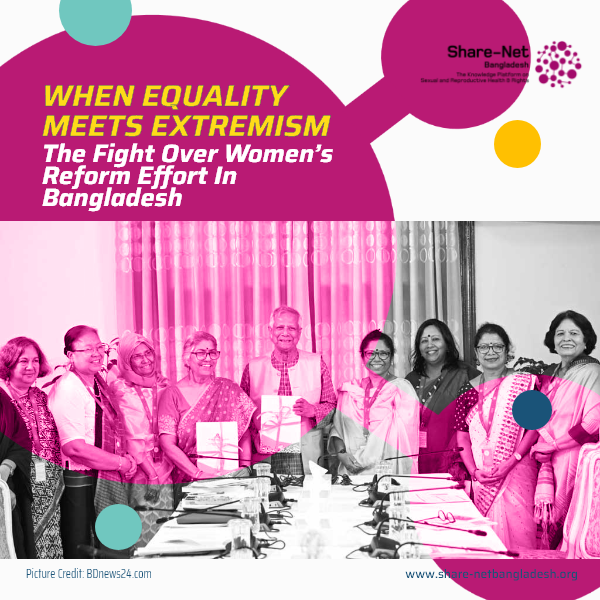When Equality Meets Extremism: The Fight Over Women’s Reform Effort in Bangladesh
The Women’s Affairs Reform Commission, formed by Bangladesh’s interim government in November 2024, has sparked sharp criticism from two major Islamist groups — Hifazat-e Islam and Jamaat-e-Islami — following the submission of its much-anticipated report last weekend.
The 433-point report, handed over to Chief Adviser Professor Muhammad Yunus on Saturday at the state guest house Jamuna, laid out sweeping reforms aimed at ensuring gender equality, safeguarding reproductive rights, and improving conditions for women workers. But instead of igniting policy-level optimism, it triggered intense resistance from religious conservatives.
“Controversial, Anti-Islamic, and Insulting to Devout Muslims”
That’s how Hifazat’s Joint Secretary General Mamunul Haque described the commission’s recommendations in a fiery press briefing. His speech, echoing sentiments from a central executive meeting held in Dhaka’s Kakrail, painted the reform proposals as a direct assault on Islamic law — particularly regarding family and inheritance issues.
Among the group’s demands: dissolution of the commission, withdrawal of the reform proposals, and the revocation of constitutional suggestions promoting pluralism. “We reject and demand the cancellation of this proposal,” said Mamunul, warning of mass protests if the government fails to meet their demands by May 3.
Jamaat-e-Islami echoed the outrage. Party chief Shafiqur Rahman called the report “immoral” and “against the Quran and Hadith.” In a statement posted on Facebook, he said, “The people of Bangladesh will not accept this.”
What’s In the Report?
While the religious backlash focuses on ideological grounds, the actual content of the report is rooted in rights-based approaches. The recommendations span 15 priority areas, with emphasis on labor law, social security, migration, and family rights.
Some key highlights include:
-
Six months of fully paid maternity, childbirth, and adoption leave.
-
Two weeks of paid paternity leave across all sectors.
-
Legal recognition of domestic and sex workers as laborers.
-
Strengthened protection for female migrant workers.
-
Elimination of workplace sexual harassment and wage disparity.
Crucially, the report also calls for reviewing laws that hinder access to menstrual regulation, safe abortion, and reproductive healthcare — issues that have long been considered taboo in conservative quarters, yet remain vital to public health and women’s autonomy.
Rights vs Religion?
The public reaction reflects a familiar but growing conflict in Bangladesh: the push for progressive gender rights clashing with conservative religious values. With 73% of Bangladeshi women still dependent on informal sectors for work (World Bank, 2023), and nearly 6.6 million women migrants at risk due to lack of legal protection, the commission’s recommendations are undeniably timely.
But the religious groups’ mobilisation shows just how difficult legal reform can be when it involves sexual and reproductive health rights (SRHR).
As the May 3 deadline approaches, the government’s silence remains deafening. Whether it will act on the commission’s proposals or backtrack under pressure may determine the future of women’s rights in Bangladesh — not just in policy, but in principle.
Source: BDNews24.com; Dhaka Tribune; Daily Star


